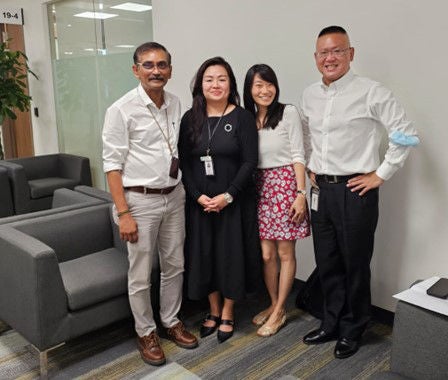
Gobi with his SGH Employee Relations colleagues. (from left) Gobi, Thara Lam, Emma Fung, Eugene Lim
The
supervisor feels that the staff was insubordinate, and the staff feels bullied.
Ramalingam Gobi Nathan from SGH Human Resources shares tips to navigate such
workplace dynamics.
What do you do at Employee Relations unit?
I handle grievances between employees to try to resolve their issues harmoniously. We are a small team of four serving 10,000 SGH staff. Every day, we have cases. These can be trivial or serious. Serious cases take a few weeks to months to resolve – with meetings and investigations. Also, we advise Senior Management on any actions to be taken to comply with Singapore’s labour law, SGH Human Resource (HR) policies and prevailing Industrial Relations practices.
What are the challenges?
When staff come to me with their problem, the main challenge is building trust. I gain their trust by showing that I am impartial. How do I do that? I will bring the two parties together. If a supervisor is involved, I will ask the supervisor to speak first before giving the staff an opportunity to respond. Then in front of the staff, I will ask the supervisor to leave and speak to the staff alone, to hear him out. This way, both the supervisor and staff will know that I am not just going by what the supervisor told me.
Sometimes staff call me for advice but they do not identify themselves upfront. They are afraid to let their supervisors find out that they had approached Employee Relations. So how do I verify that the caller is a staff? I will look at the number they are calling from. If the call is from a private number, I will give counsel up to a certain point. Beyond which, I will tell the staff that if they want more information they must identify themselves.
Do you have examples of some issues? How can they be avoided?
Most of the time, grievances are about perception.
It may be about insubordination, that is, staff not following orders or staff perceived as talking back to the supervisor.
So how can a staff speak up without being seen as insubordinate? It is about timing. We are all busy. So choose a right time to raise an issue. If you know your supervisor is busy yet you insist on talking about an issue then it can be easily perceived as you complaining or being displeased, reacting. Instead, catch your supervisor at another time when they are clearly not rushing for a deadline, or make an appointment to talk about it. This way, it would come across as a discussion made in the spirit of collaboration rather than you being outright defiant.
Supervisors should also make time to listen. Rather than wait till the annual performance appraisal, why not periodically make time to meet your staff to hear them out. It need not be very long. But it helps. Your staff will know that there will be a time for them to raise issues. This reassures them.
On the flip side, there are grievances about bullying. Staff may tell me that their supervisor shouted at them and they feel that they have been bullied. Yet, staff have to be corrected if they did something wrong. Supervisors, how do you correct your staff appropriately?
As a supervisor, you must remember that staff’s dignity must be protected at all times. This is our HR policy. So if you have to correct your staff, do not do it in front of his colleagues, or in public. Otherwise, your staff may feel embarrassed, or be afraid to speak up as there are people around. These contribute to your staff feeling intimidated, or bullied.
Devote time to coach your staff. Bring him to a room, sit him down and talk to him calmly. Mention what he did wrong, why it is wrong and give tips on how he can do better next time. Also give him a chance to explain himself. This way, your staff will feel that he had a chance to share his point of view and that you are helping him improve, not merely chiding him.
Congratulations on your 50-year Long Service Award! Wow, 50 years in healthcare…how did it all begin?

Actually, I started as a Dispensing Assistant for MOH Pharmaceutical Department in December 1973. Did you know that back then MOH manufactured our own medicines? Then in 1986, MOH posted me to SGH Pharmacy.

In 1989 and the 1990s, the public healthcare institutions were restructured. For a year, we did not have a union. My colleagues and I saw that staff who had issues did not have an avenue to raise their grievances. So we started the Health Corporation of Singapore Staff Union (HCSSU), known today as Healthcare Services Employees Union (HSEU).

I went on to work for the union and was subsequently elected General Secretary of HCSSU, representing all public healthcare institutions. In May 2007, I was invited to join SGH HR where I have been managing Employee Relations ever since.

What keeps you going for half a century?
When I see staff who had issues and were able to resolve them still serving at SGH and doing very well, this keeps me going. Also, I see myself as supporting our healthcare workers by providing them with a healthy work environment so that they are able to contribute day after day. If I am able to bridge the colleagues – help them to understand one another and work together - then I get a lot of satisfaction.
What’s next for Gobi?
*chuckling* I am already in post-retirement. For me, it is about renewal…imparting my knowledge to train the next generation of Employee Relations experts at our hospital. But I will continue to serve as long as I am able and my contribution is valued.













 Get it on Google Play
Get it on Google Play